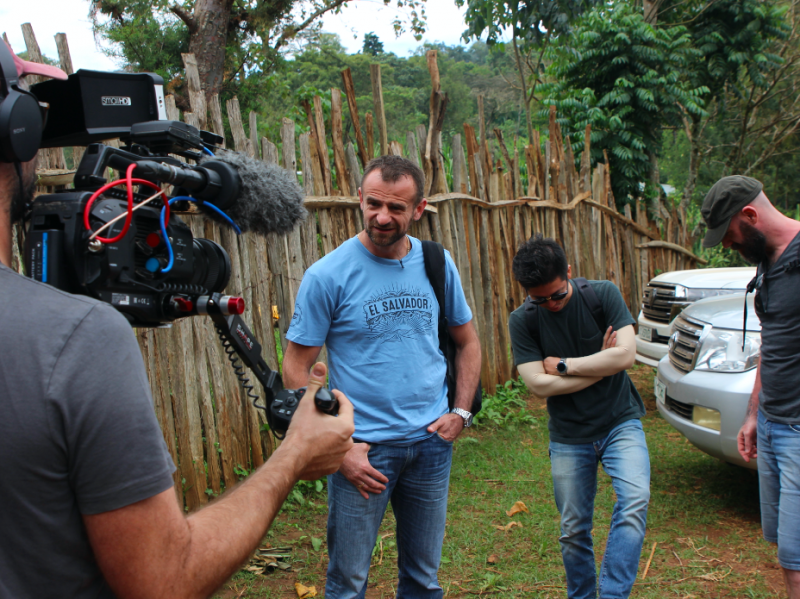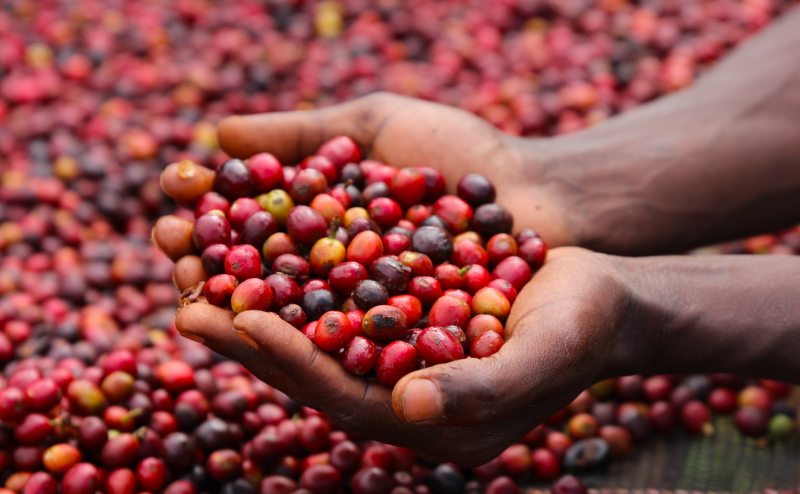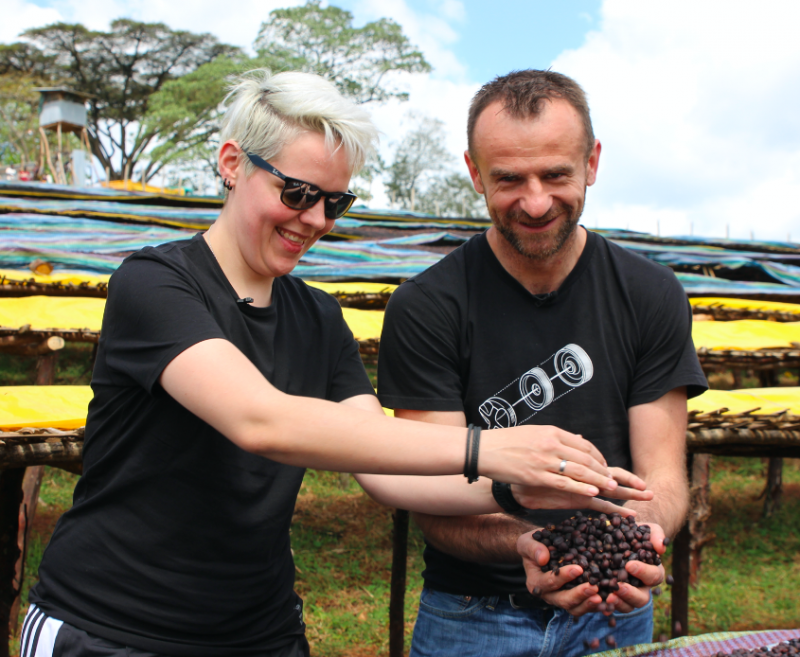As competitions heat up again and the SA circuit kicks off for the first time since 2020, we're getting excited about the top level of coffee in all it's forms!
This interview was originally published in Issue 34 .
We explore the age of origin travel and visiting coffee farms with industry pioneer, Sasa Sestic, owner of Project Origin, ONA Coffee and the World Barista Champion 2015.
In Issue 33 of Coffee Magazine we began a discussion on the way in which sourcing coffee has changed and continues to evolve towards more transparency in the process meaning greater compensation for farmers. One of the biggest changes in the last decade has been the increase in roasters finding ways to have direct contact with the farmers. While this means greater investment to support farmers and changes perspective on what the price of coffee means, is this a sustainable way to trade coffee? In terms of impact on both the farmers and the environment? Sasa Sestic is at the helm of a green coffee sourcing company based in Australia and he gives us some valuable insights into this process and the perhaps positive changes brought about by the pandemic of 2020. We also pick his brain about what it takes to be a World Champion.
All images by Jeff Hann for Coffee Heroes Film

You’ve built ONA and Project Origin around getting to know the producers and actively engaging with them. Do you think it is sustainable to encourage more and more roasters and baristas to visit origin and form direct links to farms?
I've been very blessed to work with an incredible team of people at ONA Coffee and Project Origin, and to have had the luck of being able to travel extensively throughout the world to meet and engage with producers. The second of my companies, Project Origin was built from the desire to engage with producers more at origin and find ways to create long-lasting, meaningful and sustainable relationships ... and of course, to share great coffee across the world. We realise that not every business has the capacity or desire to send people to Central America, Africa and other continents in order to meet with producers and source coffee, so part of the mission of Project Origin is to enable and facilitate direct trade and meaningful relationships between these businesses and producers. At the end of the day, it is probably not sustainable to have visitors from all the roasting business in the world travelling to coffee origins year round - the travel would undoubtedly have a negative impact on the environment, and a lot of producers would be overwhelmed by the number of visitors.
If this year has shown us anything, it's that human beings find innovative ways to connect. Even though we haven't been able to travel to visit our friends and partners at origin all year, we have still been able to maintain a lot of contact (via video calls, messaging and email) to all of our partners. Moving forward, we are certainly looking for opportunities to connect coffee professionals and roasters with producers via these formats.
Is there a point where we need to trust that green bean importers, like yourselves, are focusing on making this part of the value chain more transparent and accessible for us as industry and consumers?
I believe that every industry requires degrees of trust and transparency, and coffee is no different. However, the coffee supply chain is very unique, in that the interpersonal relationships and production of coffee feature very highly in the end product - so part of the work of being a green bean buyer/supplier is maintaining this trust and looking for ways to create and maintain mutually beneficial relationships. We need to ensure that the producers and their communities are taken care of and have the means to improve their product and livelihood, whilst also making sure that the consumer is happy with their product and where their money is going. For this reason, we also engage in a number of community projects, to ensure that coffee producing communities are receiving the care, facilities and infrastructure that they need.
If you are a business owner, you have every right to be sceptical when entering into a new relationship with a supplier or importer. However, once you have started such relationships, allowing yourself to trust and work with such people will facilitate a more compassionate and trustworthy relationship moving forward.
Does the change in perspective on coffee that comes from visiting origin ultimately outweigh any negative environmental impact? I guess another way of asking that question, is would you continue to encourage coffee professionals to visit origin if they can and why?
Every person that visits a coffee-producing country, a coffee farm or even a mill is often blown away by the genuine care and passion that comes from the people growing, harvesting and preparing coffee. I have seen countless amounts of people blown away by visiting these places ... so, I suggest that if the genuine opportunity is ever there to visit origin, you should take it. That being said, there are certainly ways in which we can try to minimise the environmental impact of travelling to these countries - rather than visit 2-3 times a year, I try to visit multiple friends, partners and farms in one trip, in order to minimise my carbon footprint from flying. Travelling by car in such places is often uncomfortable and time consuming, but the environmental impact of a car is far less than that of a plane. At the end of the day, we will always have different ways of measuring the value of visiting origin, for both consumers and producers, against the negative environmental effects of such travel. Moving forward, there is a definite need to advance and innovate our technologies in order to maintain relationships with producers whilst minimising our carbon footprints.

Can you share with us a highlight memory of one of your adventures at origin?
It's no exaggeration to say that there are too many to count, but there are certainly a few that stick out in my mind. The inspiration for starting my green bean-sourcing company, Project Origin came on a visit to a farm in India, called Thalanar Estate. Pathy, the nephew of the farm owner (Uncle Ravi), had approached me in Australia with a sample of coffee from the farm. Seeing the potential to improve the quality at the farm, I travelled to India to visit Ravi and the community. I had never been to India before, and was blown away by the colour, culture and energy of the country ... however, I was also shocked to see how many people struggled for basic needs, such as access to clean water, safe roads and general security. The idea of 'Project Origin' came from a desire to create an ongoing project, in which we would work on three pillars: 'Quality, Sustainability, Community', to help communities such as those at Thalanar Estate.
On my second visit to visit Ravi and the Thalanar community, I took several bags of roasted coffee with me. The roasters at ONA Coffee had roasted some of the Thalanar Estate coffee, and I thought it would be great to take it to India to show the workers there how we had roasted it. When I presented Ravi with the coffee, I was surprised at how shocked and ecstatic he was. I then learned that in the 25+ years that he had managed and operated the farm, he had never once tasted his own coffee from a roaster. Watching Ravi drink this coffee and share it with the community there was so touching, and it further inspired me to find ways in which we can build strong and mutually beneficial relationships with producers across the world.
It is a dream of ours to have an African barista reach the Finals of WBC. The film Coffee Heroes shed some light on just what it takes to get there. For our readers, can you tell us what are the deal breakers in building a winning team?
Many people remember watching Alejandro Mendez win the World Barista Championship (WBC) in 2011 - it was not only the first time someone from El Salvador had won, but also the first time someone from a major coffee producing country had won. I believe it is entirely possible for an African Barista Champion to achieve this goal in the coming years - Africa produces some of the finest coffee in the entire world, is home to so many passionate coffee professionals and as the birthplace of coffee, has a special connection to this product we all love so much.
The newly released Coffee Heroes film captures the journey of Polish Barista Champion, Agnieszka 'Aga' Rojewska as she works toward winning the 2018 WBC in Amsterdam. I was privileged enough to be her coach during this preparation process, and together we travelled with a group of professional barista to Ethiopia to source the best coffee for her and New Zealand Champion, John Gordon. This journey and her preparations for the competition are all captured in this film, and for anyone who is interested in coffee and competitions, I highly encourage you to watch it!
Watching a film like Coffee Heroes shows you that despite appearances and what you may see as 'natural' on stage, it is an extremely difficult task to prepare for these events. Over the years, people have said to me "Oh well of course he/she won, they are just naturally talented". I believe that for these competitions, talent doesn't exist. The ability to perform well at these events is built over time and is the result of many hours, days and years of effort. I was actually once told by a competition judge to stop competing, because I would never be good enough. Of course, this just drove me to work harder, learn more and practice, practice, practice. I was never naturally talented at barista competitions, nor is anyone else who does well at them - they put a lot of time, effort and passion into their craft.
There are many deal breakers and makers that go into producing a champion. First of all (and this is a lesson I had to learn myself), it cannot be done alone - you need a team of caring and passionate people around you to support you through training, tastings and preparing for competitions. You don't need people to agree with everything you say, or that will do everything you ask; you need people who will be honest and transparent with you, no matter what. Secondly, having the best does not equal being the best - just because you have expensive coffee, expensive equipment and a lot of investment in your competition does not guarantee that you will win, or do well. Aga went to the WBC with a custom table that was built by her dad in his workshop, and with the help of some very caring and supportive friends - I believe that those variables, combined with her commitment and passion, were what made all the difference. The main things to avoid are arrogance, pessimism and stubbornness.

I have a business partner who also made it to the Olympics and he tends to view life as a series of competitions, what is your current competition-style focus on, while travel and coffee championships are temporarily on hold?
Anyone who knows me well will know that I am by nature, very competitive. I grew up in a household that was dominated by sports and before I began a career in coffee, represented Australia at the Olympic Games in Sydney (2000) on the European Handball team. When I was a bit younger, I tended to view life as a series of competitions - I wanted to challenge myself to reach new heights, achieve new goals and to be better than anyone else. Over the years, my focus has changed a lot more towards enabling others to achieve their goals and to improve themselves. Despite my successes and achievements over the years, being a coach, mentor and manager to my staff has been a lot more fulfilling than any trophy has ever been.
My overseas travel, coffee events and competitions on hold, my focus has been on caring for my staff and for our partners overseas. Whilst this isn't a competition, there's definitely some parallels to competition life - you have ideas, consult with others, create plans, trial these ideas, see what works (and what doesn't), and then put them into practice. Once this has happened, you consult with your friends, staff, partners and anyone who is willing to be caring and honest, to see how what you're trying to do can be improved. Life isn't a competition - however, we should all be finding ways in which we can lift each other up and give each other wins, as often as possible.
Ed’s Note: Sasa and Agnieszka Rojewska feature in the film Coffee Heroes which you can stream online at www.coffeeheroes.tv